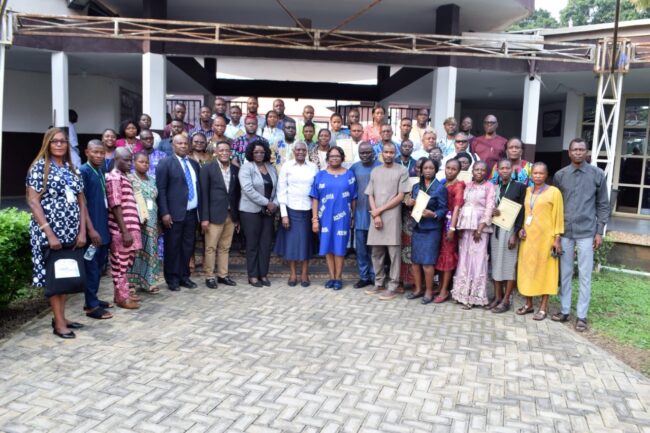The University of Ibadan (UI) has trained and certificated another set of teachers, education officers and community engagement officers from 10 cocoa-producing communities in Ondo State in the fourth phase of the certificated InternationalLabour Organisation’s (ILO) SCREAM – ‘Supporting Children’sRights through Education, the Art and the Media,’ module on child labour towards the promotion of child participation in the advocacy against child labour.
The certified SCREAM module training which was fourth in the series was sponsored by the US Department of Labour(USDOL) through International Labour Organisation (ILO)’s Action against Child Labour in Agriculture in West Africa(ACLAWA) project, which tackles the pressing issue of child labour in the cocoa sector.
The six-day training workshop held between August 29 and September 3, which included participants from ACLAWA project communities, namely -Igushi, Paranta-Bapieorisunbare, Bagbe, Ero/Mariwo, Ala, Ilu Daada, Asolo, Amurin, Tejugbola-Gberiwojo and Bajareherefore; comprised teachers, community child protection officers, local education inspectors, area education officers, a teenager representing the children among other stakeholders.
In her remarks at the commencement of the six-day training, the country director of ILO, Ms Vanessa Phala, represented by the ILO/ACLAWA national project manager, Dr Agatha Kolawole, averred that “child labour casts a long shadow across our communities in Nigeria. For generations, child labour has unfortunately been woven into the fabric of rural life in Nigeria, particularly within agricultural communities.
“Driven by poverty, families often rely on children to contribute to the family’s wellbeing and survival. Children often have to work under hazardous conditions, sacrificing their education, health, and childhood for meagre wages.
She said this not only violates their fundamental rights but also hinders their potential and perpetuates cycles of vulnerability.
Phala, however, hinted that one good thing is that Nigeria is actively combating child labour, noting that “in 2003, Nigeria adopted the Child Rights Act to domesticate the Convention on the Rights of the Child and most states assembly passed the child rights laws.”
According to her the country also launched the second phase of the National Action Plan for the Elimination of Child Labour in 2021 which provides legal frameworks and roadmaps for its eradication and in 2022 Ondo State also validated its state action plan for the elimination of child labour.
She observed that significant challenges in combating child labour remained at the global, national, state, local government areas and community level.
“The 2021 Global child labour report released by ILO and UNICEF indicated a global increase of child labour prevalence by 8.4 million to reach a staggering 160 million. This marks the first slowdown in global efforts against child labour in two decades, with Sub-Saharan Africa facing particularly daunting challenges.
“Of particular concern is the significant increase in child labour among children aged five to 11 years, now comprising over half of the global total. Additionally, the number of children aged five to 17 years engaged in hazardous work has risen,” she said.
She added: “Globally, the agriculture sector accounts for 70 percent of child labourers, shockingly, nearly 28 percent of children aged 5 to 11 years and 35 percent aged 12 to 14 years in child labour are out of school.”
She explained further that in March 2024, the ILO’s ACLAWA project began co-planning with prioritised community-level interventions in the 10 cocoa-producing communities in Ondo State.
“In March 2024, the ACLAWA project supported the Federal Ministry of Labour and Employment (FMLE) to establish Community Child Labour Monitoring Committee also known as Community Action Plan Committee. After the establishment, the ACLAWA project trained over 100 committee members, Community Development Officers, NOA CommunityMobilisation officers and Agric extension officers on their roles in the elimination of child labour at the community level,” Phalastated.
Declaring the workshop open, the vice chancellor of the University of Ibadan, Professor Kayode Adebowale in his speech, delivered by the deputy vice chancellor (Academics), Professor Aderonke
Baiyeroju, described the curriculum for the just concluded fourth SCREAM training as particularly unique and noteworthy, saying that “it emphasises the development of skills at all levels, which is germane to nation-building.”
Professor Adebowale said the focus on practical skills development would empower the participants to make meaningful impact in their communities, contributing to Nigeria’s growth and developments.
While he extolled the USDOL on its impressive commitment to eradicating child labour globally, particularly in West Africa, he said that “the funding support demonstrates the US government’s dedication to promoting fair labor practices, protecting vulnerable populations, and fostering sustainable development.”
He also commended the ILO’s leadership in combating child labour, making them trailblazers in Nigeria and worldwide, adding that “their expertise and resources have been instrumental in shaping this training programme, ensuring its effectiveness in addressing the complex issues surrounding child labour.”
Director, Centre for Excellence in Teaching and Learning(CETel), University of Ibadan, Adedoyin Aguoru, in her address, recognised the critical role of ILO in shaping global labour standards and practices, stating that ‘their partnership with UI highlights the importance of collaboration in addressing complex social issues.”
While commending the team of experts and facilitators; Professors Akin Odebunmi, Anthony Bolarinwa, and IfeanyiOnyoenoru, she mentioned that they developed the current SCREAM module and had exponentially managed the trainings since its inception, adding “their dedication to this course is truly inspiring.”
In her closing remarks, at the end of the workshop, theILO/ACLAWA national project manager, Dr Agatha Kolawolelauded the USDOL for funding the ACLAWA project, saying “if not for USDOL, we would not be here.”
She implied that the ACLAWA project supported the fourth SCREAM module through what she called ‘its Outcome 2.3,’ aimed at – increased access to education, livelihoods, or other forms of social protection in agricultural communities.”
According to her, the focus was to support the participation of children in the campaign and advocacy against child labour by promoting social protection and occupational safety and health, hence the inclusion of social protection and Occupational Safety and Health (OSH) in the presentations of the fourth SCREAMmodule training.
She appreciated Professor Sulaiman Adesina Yusuf of the Department of Agricultural Economics, UI, for his selfless service and presentation on social protection and the OSHOfficer from the Federal Ministry of Labour and Employment, Mr Oluyemi Olumide who delivered the ILO OSH specialist presentation on OSH at the workshop.
She expressed optimism that the effective implementation of the various knowledge gained from the training would result in an impactful intervention by the children, charging the participants that, “I look forward to the implementation of the outlined next steps, especially in our communities-Igushi, Paranta-Bapieorisunbare, Bagbe, Ero/Mariwo, Ala, Ilu Daada, Asolo, Amurin, Tejugbola-Gberiwojo and Bajareherefore.”
She appreciated the deputy vice chancellor (Academics), Professor Aderonke Baiyeroju for her leadership and support always.
Declaring the training closed, Professor Baiyeroju, said she was proud “as the DVC, Academics, to oversee the academic components of this project,” which she noted “aligns with our university’s mission to promote social justice, creativity, and innovation.
Addressing the participants, she said: “The SCREAM initiative, in which you have undergone training, under the Action against Child Labour in Agriculture in West Africa (ACLAWA) project, is a shining example of how academic rigor and practical application can combine to drive meaningful change.
“As we move forward, we will continue to monitor and evaluate the impact of the SCREAM initiative. We will gather data, conduct research, and assess the effectiveness of our approaches. This will enable us to refine our strategies, address challenges, and scale up our efforts.”
She applauded the ACLAWA/SCREAM Team University of Ibadan and Centre for Excellence in Teaching and Learning Team (CETeL), the US Department of Labour (USDOL) and International Labor Organisation (ILO), and the participants for their dedication and hard work.
“Together, we have achieved something remarkable, and I have no doubt that our collective efforts will lead to meaningful and significant change,” the DVC said.
The trio of Mr Duyilemi Josiah Akindoye, from Agric. Development Project, Akure South Local Government; PastorSimeon Ogunyemi, Anglican Grammar School, Ero, IfedoreLocal Government, and Mr Ademigoke Adegboye, a child protector from Tejugbola/Gberiwo, Idanre Local Government,who commented on behalf of others about the training said it was insightful as they were being engaged by the scholastic team of the premier university.
They promised to be change agents in their various households, schools, fields, organisations and communities as well as be worthy ambassadors of the SCREAM module and ILO’sACLAWA project.
They also appreciated the organisers of the programme for choosing them as beneficiaries of the fourth SCREAM module training.
READ ALSO: Abandoned newborn found in Kano






